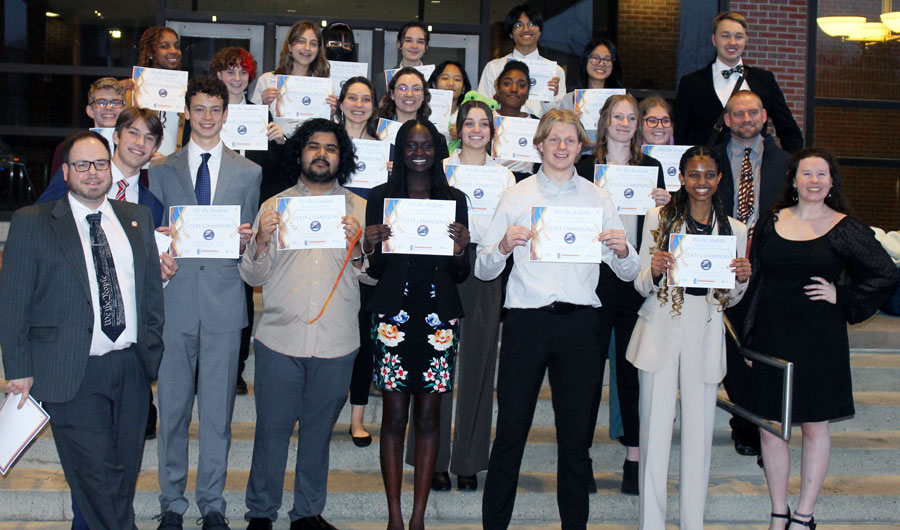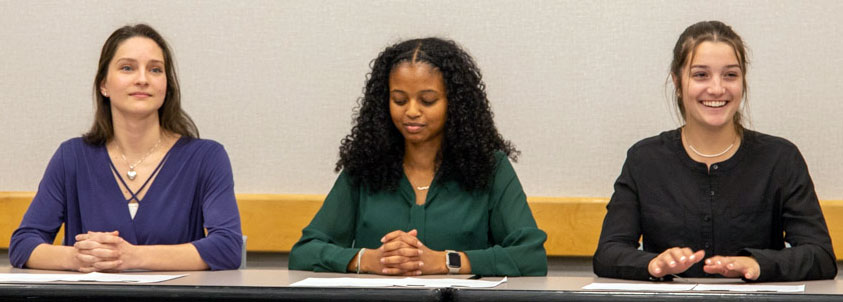Kentwood — Mika Nguyen sketched notes on the classroom whiteboard. Her topic: the expansion of bureaucracy in the United States.
Rebecca Moore and Drew Dame looked on while doing their own research in preparation for the We the People national championship competition in Washington, D.C., April 22-24.
The East Kentwood High School seniors and their 18 teammates are state champions in the competition that assesses civic savviness. They are exploring topics related to the U.S. Constitution, its principles and impacts over time. They’ve learned how to connect the authors’ intentions from more than 200 years ago to historical events and current day issues.
“It’s really cool to see how issues like abortions and affirmative action have grown from their foundations and how a bunch of history has led up to what’s been happening recently,” Mika said.
Soon, they will take their knowledge to the national stage, dressed in professional attire like young lawyers and politicians and presenting prepared responses to questions judges throw their way.
The next two months will see the team focusing on a fresh list of competition questions, building on what they’ve already learned this school year and since clinching the state title in January at Michigan State University. It is the first time the team has won the state competition since 2010, doing so with the highest East Kentwood score ever tallied. (Between 1988 and 2010, they were state champions 14 times.)

One More Thing to Know
The team is part of the senior-level class American Political Thought, which students take after they have completed AP Government. Taught by Justin Robbins, APT uses the foundational information learned in AP Government as a preamble to much more complex study.
“One of the early realizations in APT as a part of We the People is how much you don’t know,” Robbins said. “You hear about a concept that you think you understand from AP Government, and then the next thing you know, you are looking at the Enlightenment roots and colonial evolution of it and you’re weaving in philosophy and case law you’ve never heard of.”
He said students become more aware of current events and start to evaluate historical events differently. Their minds open up to the idea that there is always more to learn.
“Once they get past the initial shock of ‘there’s always one more thing to know; there’s so much I don’t know’ — I think that’s a really good lesson no matter what field they are going into,” said Robbins, who took over as We the People coach in 2018 and also teaches AP Government.
History often connects with hot topics today, he explained, and students learn to see those links.
“Students learn to cite historical information — such as government responses to smallpox during the Revolution and other outbreaks in the 1800s and 1900s — to Covid responses and whether they were effective and signified too much or too little government.”

Hundreds of Hours, Lots of Support
In We the People, students compete in six separate units of three or four students each. To prepare for January’s state competition, they collectively logged more than 160 hours of practice outside of the school day. That included more than 50 sessions with coaches during the winter break.
‘Having a group of people around me who are so smart and also really good at reasoning and having different perspectives has been a really good way for me to shape my thoughts.’
– senior Connor Shaw
Robbins said this year’s team has great camaraderie and a lot of support from alumni who serve as coaches. They’ve used the experience of former teams to refine their performance and processes.
“They have some of the best attributes of the previous teams, all in one place together,” Robbins said.

Senior Dewaynia English said learning information and applying it to questions for We the People is helping her prepare for college and her career goals. She plans to study political science and hopes to become a house representative in Congress.
“Working with a team and being tested on my knowledge” has been one of the most enjoyable parts, Dewaynia said. “Because with whatever you say, there is always a ‘why’ or more details to get to the bottom of something. You might be thinking something and then someone says something you never thought about, and it furthers your knowledge, so that’s really great.”
Senior Connor Shaw said he’s loved bouncing thoughts off his team members and developing his critical thinking skills.
“Having a group of people around me who are so smart and also really good at reasoning and having different perspectives has been a really good way for me to shape my thoughts.”











